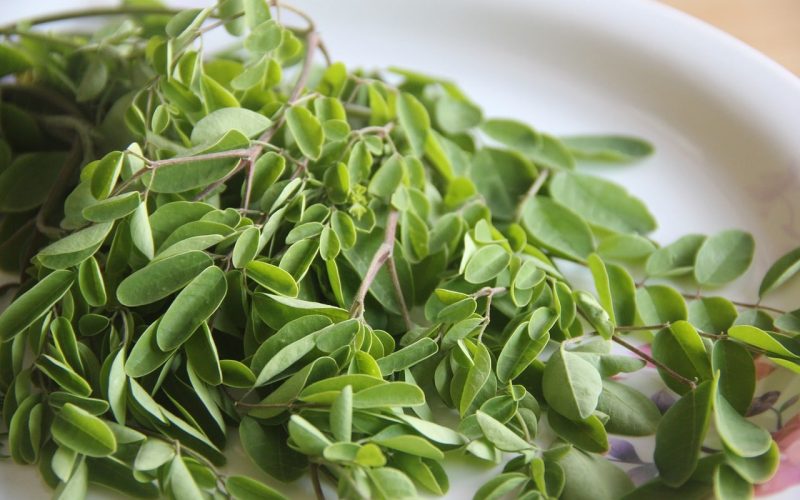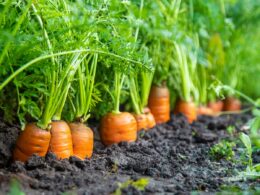There is a huge chance that you’ve never heard of Moringa before. Even though the moringa plant has been discovered for its many beneficial properties thousands of years before now.
It was only recently that people began to know and embrace moringa as one of the most impressive herbal supplements to have ever existed in the market.
The moringa tree also goes by the name ‘Ben oil tree’ so if you have heard of the Ben oil tree, then we’re talking about one and the same plant.
To make you better understand how beneficial moringa is to health, in the year 2018 national institutes of health tagged moringa the plant of the year.
Acknowledging the fact that like no other single plants species, the Moringa oleifera has the potential to help resolve quite a number of environmental problems and also provide lots of unmet human needs. It goes without saying that the benefits of moringa still remains highly under-estimated.
At present, more than 1300 studies, reports, and articles have focused primarily on the health benefits of the moringa plant.
These writings have looked at the plant’s healing abilities, as well as other vital benefits that it has to provide to parts of the world that are especially susceptible to the outbreak of certain diseases and also nutritional deficiencies.
Several studies have revealed that just about any and every part of the moringa plant is useful in one way or another.
These parts could be for use as an antioxidant tea or even for the production of oily substances that nourishes and helps to lubricate the skin.
There are several conditions that have been treated using moringa in different places around the world. Below are just a few of them.
- Cancer
- Inflammation-related diseases
- Anaemia
- Diabetes
- Constipation, stomach pains and diarrhoea
- Arthritis and other joint pain, such as rheumatism
- Allergies and asthma
- Stomach and intestinal ulcers or spasms
- Epilepsy
- Heart problems, including high blood pressure
- Chronic headaches
- Kidney stones
- Thyroid disorders
- Fluid retention
- Low sex drive
- Bacterial, fungal, viral and parasitic infections.
The moringa plant is a great source of potassium, vitamin A, calcium, vitamin C, and protein. One question you might want to ask, is just how strong is moringa exactly?
Well according to an organisation called kulikuli which harvests moringa plants in West Africa and exports them to the United States and other Western countries, a gram of Moringa contains the following:
- Twice the total amount of protein of yoghurt
- Four times the total amount of vitamin A as carrots
- Three times the amount of potassium contained in bananas
- Four times the amount of calcium in cow’s milk
- Seven times the vitamin C content as oranges
6 Popular Moringa Benefits
The moringa plant is known by over 100 different names in different languages around the globe. The plant is very easy to grow and it is a tropical plant species that are native to the Himalayan mountains, as well as parts of Africa and India.
The beautiful thing about these plants is that it comes with more than 90 protective compounds including flavonoids, isothiocyanates, and phenolic acids.
Moringa has gained for itself a reputation for combating inflammation, as well as getting rid of the various effects of ageing and malnutrition. This is why it is popularly called the miracle plant.
1. Moringa provides Antioxidants and Anti-Inflammatory Compounds
The many health benefits of herbs like moringa a very impressive, and one of the reasons why this is so is because these benefits are similar to What can be provided by conventional drugs.
However, the moringa plant does not pose the same level of risk that comes with the side effects of taking conventional medications.
Per a recent report published in the Asian Pacific Journal of Cancer Prevention, the moringa plant contains a mix of carotenoid phytonutrients (the same kinds found in plants like tomatoes and carrot), essential amino acids (these are the building blocks of proteins), some antioxidants like quercetin, and some natural antibacterial compounds that work the exact way many anti-inflammatory drugs work.
The leaves of the moringa plant are high in different anti-ageing compounds that help to lower the effects of inflammation and oxidative stress including vitamin C, quercetin, polyphenols, beta-carotene, and chlorogenic acid.
All of these are associated with a reduction in the risk for chronic diseases such as diabetes, stomach, colon or lung cancer, hypertension, as well as age-related eye defects.
2. Helps to Balance Hormones and Slow the Effects of Aging
A study carried out in 2014 and published in the Journal of Food Science and Technology, tested for the effects of the moringa plant and the amaranth leaves on levels of oxidative stress and inflammation in adult women experiencing menopause.
With the knowledge of the fact that valuable antioxidant enzymes become affected during the period post menopause, because of the deficiency of youthful hormones like oestrogen, researchers sort to find out whether these plants could help slow down the ageing process by using natural antioxidants that may help to balance hormones naturally.
Ninety postmenopausal women between the ages of 45–60 years were selected and divided into three groups given various levels of the supplements.
Levels of antioxidant status, including serum retinol , serum ascorbic acid, glutathione peroxidase, superoxide dismutase and malondialdehyde were analyzed before and after supplementation, along with fasting blood glucose and haemoglobin levels.
Results showed that supplementing with moringa and amaranthcaused significant increases in antioxidant status along with significant decreases in markers of oxidative stress.
The study had 90 postmenopausal women between the ages of 45-60 years. the women were divided into three groups and were given the supplement at different levels to try out.
The levels of antioxidant status, including serum ascorbic acid serum retinol, glutathione peroxidase, malondialdehyde, superoxide dismutase were analyzed both before supplementation and afterwards, along with fasting blood glucose and haemoglobin levels.
The results were amazing as it was discovered that women who had moringa in their supplements experienced a balance in hormones, reduced oxidative stress and many other positive outcomes. The study so revealed better fasting blood glucose control as well as a positive increase in haemoglobin.
All of these led the researchers to conclude that moringa processes therapeutic potentials that may help to prevent complications that arise due to ageing and even natural hormone changes.
Some studies also revealed that moringa works great as a birth control compound and can also benefit the libido.
Despite the fact that moringa has been used as a natural aphrodisiac for a long time, it also has been discovered that moringa can help reduce the rate of conception. Nevertheless, this magic plant can help to boost the immune system during pregnancy as well as increase lactation.
3. Moringa Helps to Improve Digestive Health
Due to the anti-inflammatory properties of the moringa plant, it has been used in traditional medicine to treat conditions like liver disease, stomach ulcer, fungal or yeast infection, kidney damage, infections and even digestive complications.
Moringa oil is quite expensive, thus a lot of people might not have come across it. However, one of the primary uses of this oil is to boost liver function by detoxifying the body of harmful toxins and other substances.
It is also suspected that the moringa oil may be able to fight kidney stones, constipation, urinary tract infections, diarrhoea, and fluid retention.
4. Moringa helps to Balance Blood Sugar Levels and Fights Diabetes
The moringa plant contains a kind of acid known as chlorogenic acid. This acid has been discovered to help with the control of blood sugar levels and also allows cells to absorb or release glucose as necessary.
This automatically makes moringa a natural anti-diabetic plant, and also proves of its hormone balancing properties. Apart from the chlorogenic acid earlier mentioned, compounds known as isothiocyanates are also present in moringa and they have been linked to natural protection against the illness called diabetes.
A study published in the international journal for food science technology revealed that moringa possesses positive effects on the control of blood glucose as well as insulin levels in diabetic patients when eating as part of a meal that is high in carbohydrates. The study tested the effect of three different plants which are bitter gourd moringa and curry.
When the three plants were included in a meal containing various levels of glucose, it was discovered that plasma insulin responses were significantly reduced compared to when the plants were omitted from the foods. This goes to reveal that all three plants provide the same effects.
5. Protects and Nourishes the Skin
The moringa plant contains lots of natural antibacterials, antiviral, and anti-fungal compounds which protects the skin from different kinds of infections.
A few of the popular ways that moringa used for skin and even oral treatments include: treatment for inflammation’s associated with pimple or acne outbreaks, athletic foot, to eliminate odor, to treat pockets of infection or abscesses, to fight gum diseases, to get rid of dandruff, to help heal Burns and bites and also for treatments of viral warts and wounds.
People apply moringa oil directly to the skin as astringent agents that are used to kill bacteria, as a drying agent, but also the oil can be used to hydrate the skin with regular application. This is possible because the oil restores the skin’s natural moisture barrier.
Do not be surprised if you see moringa oil as an ingredient in foods or even in perfumes. It is used because it helps to prevent spoilage by eliminating bacteria. And also, the oil has a very pleasant smell which helps it to reduce odour in foods or products.
6. Helps has Mental health benefits (stabilize your mood and protects Brain Health)
As we have earlier mentioned, moringa is a plant that is high in protein and also a rich source of the amino acid known as tryptophan. What this means, is that moringa benefits the functions of neurotransmitters and this includes those that produce serotonin which is the “feel-good” hormone.
Another benefit of moringa is its richness in antioxidants and compounds which help to improve thyroid health this makes moringa very beneficial for maintaining a good level of energy and also fighting depression, fatigue, mood swings, low libido, and even insomnia.
Moringa nutritional facts
Apart from the palm-tree, moringa is another very unique plant because no part of it goes to waste. The seeds, the leaves, the pods and flowers, the stem, and even the roots of a moringa tree is useful. All the parts can be a source of nutrition and even provide medicinal value to people who care to use it.
A lot of people use moringa for its antioxidant qualities, thus one of the most popular ways of using it is grinding its leaves or seeds for use as detox or even for cooking. This way, the user gets to enjoy the very best of moringa benefits.
The leaves of the moringa plant are loaded with so many nutrients including protein, antioxidants, vitamin C, better carotene, calcium, and potassium.
Because these leaves provide a concentrated source of vitamin A, lots of parents give moringa to their children especially in third world countries, as a supplement. This is because vitamin A deficiency is a life-threatening one and it is linked to an impaired immune system function.
Because moringa has an exceptionally high nutritional value it can easily be used to derive vital proteins, trace minerals, and phenolics. Moringa contains a very unique and rare combination of disease-preventing phytonutrients which includes zeatin , quercetin , caffeoylquinic, beta-sitosterol, kaempferol and caffeoylquinic acid.
Different studies have revealed that these compounds are capable of protecting the heart, they possess anti-tumour, natural circulatory stimulants, anti-ulcer, antiepileptic , anti-diabetic, anti-spasmodic, and antihypertensive qualities.
To take advantage of all the above-listed benefits, people brew dry Moringa leaves into a nice smelling and tasty tea by soaking the dried leaves in hot water which helps to release all the special chemical compounds that are beneficial to health.
This is done in a similar way to how green tea is made. It is also very possible to ground dried moringa leaves so as to create a powder that is long lasting or even to create concentrated moringa capsule supplements.
Apart from taking advantage of the wonderful moringa leaves, the moringa pods also contain seeds that produce a type of healing oil.
The oil derived from the moringa seeds are usually used for cooking or applied directly to the skin as a treatment for burns, or even as a way to help the skin retain moisture.
Another interesting thing that the moringa seeds is used for is water purification. Pouring a couple of moringa seeds into the water allows the impurities to cling onto the seeds, making it easy for you to scoop them out of the water easily.
Apart from helping you reduce the number of impurities and toxins in your water, moringa seeds can also help you get freshwater as salt easily clings to them.
That way, the contaminated water you have in your house can easily be turned into safe drinking water. So the next time you think about the many moringa benefits, do not forget to include water purification as one of them as a lot of people do not even know this.
Moringa vs. Matcha
Matcha and moringa are two superfoods that have so many things in common. Both sister plants have wonderful anti-inflammatory, antioxidant, and anti-ageing qualities. They protect the heart, they guard the brains and even increase the functions of our immune system in different ways.
The two plants are not only similar in appearance, but also in use. Both plants are made into teas and even powders. However, despite their many similarities, they still have a few notable differences in terms of their nutrition profile.
While both plants can be comparable in terms of their calories, it has been discovered that gram for gram moringa contains more calcium, fibre, protein, sodium, vitamin A, and vitamin C, than matcha does.
One of the most obvious differences between matcha and moringa green tea is in regards to their amino acid concentration. Surprisingly, moringa leaves are a wonderful source of protein since they provide us with 9 different essential amino acids that are required for protein synthesis.
The amino acids are leucine, threonine, histidine, lysine, tryptophan, methionine, valine, and phenylalanine. This explains why health bodies such as the World Health Organisation primarily rely on moringa for use as a supplement for low calories diet and also to prevent protein deficiencies.
On the flip side of the coin in Matcha defence, matcha tea contains 15 times more active ingredients than any other form of green tea and it provides different antioxidants and large doses of epigallocatechin gallate (EGCG) which is very beneficial to the human brains.
Moringa leaves are known to provide epigallocatechin gallate which means that a combination of both matcha and moringa to make a cup of green tea will provide lots of essential benefits. Unlike when only one of these leaves is brewed.
History and Uses of Moringa
It is believed that there are over 12 different varieties of the moringa tree, but the moringa oleifera is by far the most popular and used variety.
This particular species of moringa is fast-growing and very leafy. It also produces pods and flowers that have been used by different health authorities all around the globe as supplements for malnutrition for many years now.
Even before it was scientifically proven that moringa has lots of health benefits, people in northern Nigeria have made soups and porridges with this plant for hundreds of years.
One other amazing characteristic of the moringa plant is its capability to grow in dried or completely depleted soils where many other trees and plants will not dare to survive.
This explains why people in regions where they are undernourished or people in countries such as India and Somalia enjoy the benefits of moringa whenever they have to deal with famine.
Apart from moringa been able to provide vital nutrients, it also helps to restore dead soils and even plays a vital role in Forest restoration efforts. We have earlier mention that it works great for water filtration, produces a very good oil that is beneficial to the skin, and is even used in the production of supplements or medications.
The moringa plant is not a seasonal one so it grows all year round and is easily available for consumption. As the moringa plant goes through its normal life circle, it replenishes nutrients in the soil and makes it a better place for other plants to grow and flourish.
How to Use Moringa?
From all we have written so far, you can probably tell that the moringa plant can be used in different ways to utilise all of its wonderful benefits. Shipping the moringa seeds or any part of it from Africa or Asia to other parts of the world usually requires long transport time.
Thus it is usually processed and turned into powder or capsule form before being transported from the countries where they are grown to other countries where it is not available. This process of converting from leaf or seed form into powder form prolongs its shelf-life.
About the taste of moringa, trust me when I say it is not one of the most pleasant you can think of. As a matter of fact, some people have explained that moringa tastes like a mixture of asparagus and horseradish.
Despite the fact that nobody would probably enjoy the taste of moringa, it does not negate the fact that moringa remains one of the best supplements in the world because of its rich supply of vital nutrients.
Unlike other supplements or medications, there is no required or recommended dosage when it comes to moringa at present. This especially is because it is only a herbal supplement and not exactly an essential nutrient.
With that already pointed out, there is some available evidence that the best dose for human consumption has been pinned at 29 milligrams per kilo of body weight.
If you want to start taking moringa it is recommended that you begin by consuming half a teaspoon of dried moringa leaves orally per day. You can do this for three to five days, then gradually increase your intake over a two-week period so that your body can get used to its effects.
The reason why most people would rather use moringa once in a week or at most twice is that when used every single day for a long period of time the user might begin to experience stomach upset as moringa has laxative effects. Here are some of the most popular ways to use the moringa plant for health purposes:
Dried Moringa leaves or moringa powder
Normally, you would need as much as seven pounds of moringa leaves to make just one pound of dried moringa powder.
People consider the leaves of this plant the most Potent part of it because it has been discovered that the leaves contain more antioxidants and micronutrients than any other parts of the moringa tree.
If you cannot get access to fresh Moringa leaves, you can search for the dried form or even the powdered form of the leaf and take them after a meal or with a meal instead of on an empty stomach.
Moringa tea
This is very easy to make. All you have to do is get some dried leaves and soak them in hot water just the same way you would make any other kind of herbal tea. Whenever you want to purchase dried moringa leaves, make sure that they are sun-dried as this type contains well-preserved compounds.
Never make the mistake of boiling your moringa leaves if you want to retain the best nutrients. Although the people in northern Nigeria cook with moringa leaves, it is best not to cook with them as boiling the leaf might kill the vital nutrients.
Moringa seeds:
You can buy the seeds dried or get fresh ones and boil them.
Moringa oil:
This can be bought from your local market and used for cooking or in beauty products
Potential Moringa Side Effects & Concerns
Because moringa is a completely natural and chemical-free substance (that is if you’re lucky enough to purchase high quality and pure brand) when taken by mouth or applied on the skin, moringa seems to be very well tolerated and less likely to cause any kind of side effects.
Moringa oil, fruits, leaves, and seeds have been safely consumed for many years. Today, there are different forms of moringa supplements and extracts that are in the market, so it is very vital that you purchase the purest kind available.
If you do not live in a country where Moringa is grown, then there is a possibility that some of the moringa products you find in the market might be combined with synthetic ingredients toxins and even fillers this is why it is very important that you read through the ingredients written on the label before you make a purchase. See to it that you carefully follow dosage directions.
When breastfeeding or during pregnancy, it is important that you avoid consuming any form of moringa extract or even high doses of the supplement as there is not enough research to prove that it is healthy for nursing mothers or pregnant women.
If you must use moringa as a nursing mother or a pregnant woman, ensure that it is under the care of a medical practitioner just to be on the safer side.







